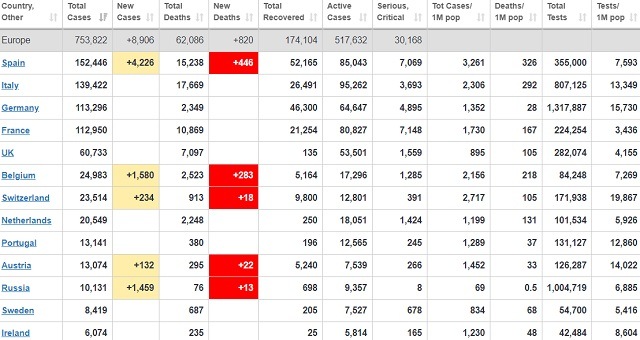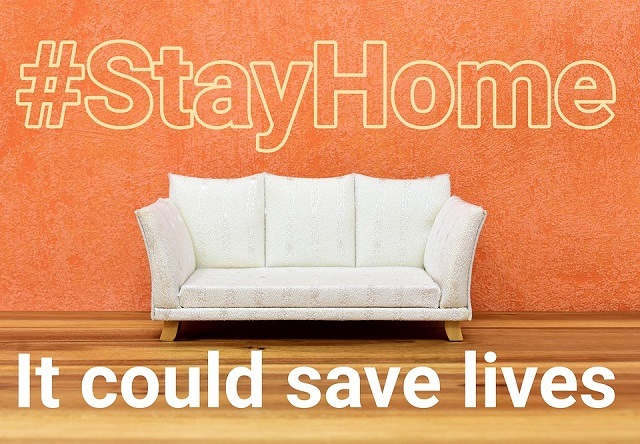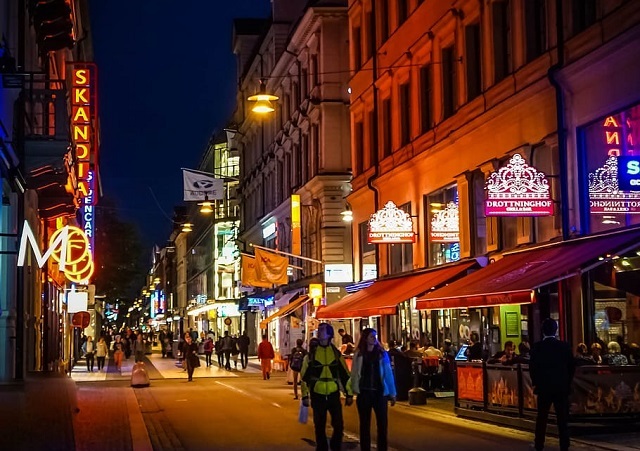Sweden is one of the only countries in Europe where bars are still open for business.
With most of the region living under enforced draconian measures including full national lockdowns, Sweden stands alone as a nation who is refusing to allow the coronavirus to stop their way of life. The controversial stance is supported by the majority of Swedes who, according to a recent poll, are at least ‘quite confident’ in the precautions being taken by central government. The lack of a lockdown means that Swedes can head to the city’s bars and restaurants, go to work and socialize in an environment largely unaltered by the spread of COVID-19. So, could Sweden be the last place in Europe where you can hook-up?
In this feature, we take a look at how the pandemic has affected Europe and why Sweden is the only nation deciding against a public lockdown.
Europe & The Coronavirus Pandemic
Initially cropping up at the beginning of December 1999 in a few isolated cases in Wuhan City, China, COVID-19 first came to the attention of the World Health Organisation (WHO) on 31st December 1999.

Over the course of just a few weeks, the virus spread beyond China and reached Europe on 24th January 2020. The first three positive cases of COVID-19 were reported in France with the onset of symptoms occurring on 17th, 19th and 23rd January.
France was also the first European nation to record a death from coronavirus with the first casualty being reported on 15th February 2020.
By the 13th March 2020, WHO considered Europe as the epicenter of the pandemic with cases (on average) across the region doubling every 3-4 days. In some nations, this was every two days.
Since the arrival of COVID-19 in Europe, every single country has now had confirmed cases of the virus. Although the epicenter has now changed and the United States is now considered the active center of the coronavirus outbreak, much of Europe is under lockdown measures with citizens being told to stay at home. Some countries have gone even further, introducing curfews and issuing fines to those who head outside without a good reason.
As of 9th April 2020, a total of 753,822 cases have been confirmed across Europe with 62,086 deaths and a further 30,168 people who were seriously critical with the virus.
The worst affected countries are detailed in the table below by confirmed number of cases:

Each European country has implemented similar, and gradually more restrictive, measures to tackle the spread of coronavirus with those with the highest number of cases taking the strictest approach.
Spain
The country went into a national quarantine on 14th March 2020 with the Spanish authorities banning all unnecessary trips. This followed the closure of schools and universities earlier in the same week. However, bars and city parks were still found to be busy and confirmed cases (and the death toll) continued to rise.
As a result, on the 28th March 2020, the government imposed tighter restrictions on its citizens by ordering all non-essential workers to stay at home.
Spain remains one of the worst affected countries in Europe with a total of 152,446 confirmed cases and a death toll in excess of 15,000 people.
The economic impact in the country is also thought to be devastating with an estimated 900,000 people made unemployed by the outbreak of coronavirus.
Italy
The death toll in Italy has been at the centre of media attention surrounding the European outbreak and more than 17,000 people have died of the virus since the first cases were confirmed on 31st January 2020.
They were one of the first nations to impose restrictions on movement with the worst affected region of Lombardy being forced into quarantine on 8th March 2020.
The Italian Prime Minister extended this lockdown to the entire country on 9th March 2020.
Germany
The virus reached Germany on 27th January 2020 with confirmed cases in a region near Munich. Thought initially to have broken out from a car parts manufacturer, new clusters began to break in various parts of the country, some related to citizens returning from Italy.
The first death in the country occurred on 9th March 2020 and measures to control the movement of citizens began a few days later.
On 13th March, schools and nurseries were closed and the elderly were placed in social isolation with a ban on visiting nursing homes. The initial efforts to protect the vulnerable were ramped up on 22nd March when a national curfew was introduced. People may currently only leave their homes for essential activities and may not gather in groups of two or more if they do not belong to the same household.

France
The location of the first known European case of coronavirus, France announced on 12th March 2020 that schools and universities would close on 16th March 2020. The following day the government banned gatherings of more than 100 people. By 15th March 2020, the restrictions went even further with the immediate closure of nonessential public places including bars, restaurants, discos and cinemas.
United Kingdom
And, in the UK the situation is similar with the first case being reported on 31st January 2020.
The first death occurred on 5th March yet advice on social distancing wasn’t issued until 12th March 2020, after the WHO had declared the outbreak as a pandemic.
Heavily criticised for their slow response, the government announced on 18th March 2020 that schools would close. This was followed on 20th March 2020 by the further closures of bars, cinemas, pubs and all other non-essential public places of business.
On 23rd March, measures to further reduce the spread and protect the National Health Service were introduced which have effectively placed the entire country in quarantine.

Sweden’s Response to Coronavirus
By contrast to those worst affected areas of Europe and the stance being taken by most other countries in the region, including Norway, Denmark and Finland, Sweden has yet to declare any national curfews or lockdown measures.
The first case in Sweden was reported on 31st January 2020 with the first fatality in the country being recorded on 11th March 2020.
Sweden’s constitution prohibits ministerial rule which has meant that the measures recommended by central government are voluntary; yet, the Public Health Agency has advised the temporary ban on gatherings of over fifty people as well as the closure of secondary schools.
Primary schools remain open in an effort to help key workers continue in their front-line roles.
Government advice also recommends that, where possible:
- People work from home
- People over the age of 70 stay at home
- Unnecessary travel is avoided
- People adhere to social distancing measures
Beyond these measures, the country is largely being left to run, ‘business as usual’.
Across Sweden’s main cities, bars, restaurants and other public places are open and even some domestic sporting events continue to be held.
Sweden Goes It Alone
The mitigation strategy being adopted in Sweden is one which the United Kingdom initially attempted to follow. The aim, instead of stopping the spread altogether, is one of simply slowing the transmission rate and allowing the population to become infected in an attempt to build up ‘herd immunity’.
Other countries abandoned this approach with increases in infections showing an alarming speed of casualties being taken into hospital. Critically, the U-turn in the United Kingdom was based on a report from the Imperial College London which suggested that such a plan would result in the deaths of more than 250,000 people.
According to Sweden’s state epidemiologist Anders Tegnell, the scientist leading the efforts to tackle COVID-19, lockdowns are ineffective at halting a disease unless they are adopted at a very early stage. He added, in an interview with the Mail on Sunday, (at certain times)….they can be useful, if you are unprepared and need more intensive care facilities.

Sweden’s strategy is more in line with the research published by Harvard University which suggests that a lockdown simply moves the problem back by a few months; as strict social distancing measures are lifted, cases rise again.
With Prime Minister Stefan Lovren trusting the population to ‘act like adults’, the response from the public has been supportive. Around three in four Swedes are (at least) quite confident that the country is doing the right thing.
Not everyone in Sweden is convinced and a petition signed by more than 2,000 scientists, doctors and academics has been presented to government in an effort to tighten restrictions on movement within the population.
Sweden has also been attracting criticism from outside of the country with medical professionals and scientists accusing the authorities of endangering lives. A study in the medical journal, The Lancet, indicates that the strategy of mitigation is increasingly becoming more unpopular and is unwelcome in the international community.
The advice from the WHO remains one of extreme caution; they strongly recommend physical distancing and isolation of positive cases as well as practicing regular routine hand-sanitizing.
However, as of 9th April 2020, Sweden remains firm on its controversial policy with no further measures being introduced to encourage (or legislate) a lockdown.
As a result, Sweden may well be the last bastion in Europe where people can still head out to bars, clubs and restaurant with casual socializing, for the moment, being unaffected.

Unfortunately, with much of Europe now under travel restrictions, the only people likely to benefit from this liberation are the locals.
Coronavirus Data up to and including 8th April 2020: Sweden currently has the 12th largest number of confirmed cases of COVID-19 in Europe with 9,141 people testing positive. The number of deaths stands at 793 (9th highest).
Featured image via Pixabay/Public Domain Pictures.

